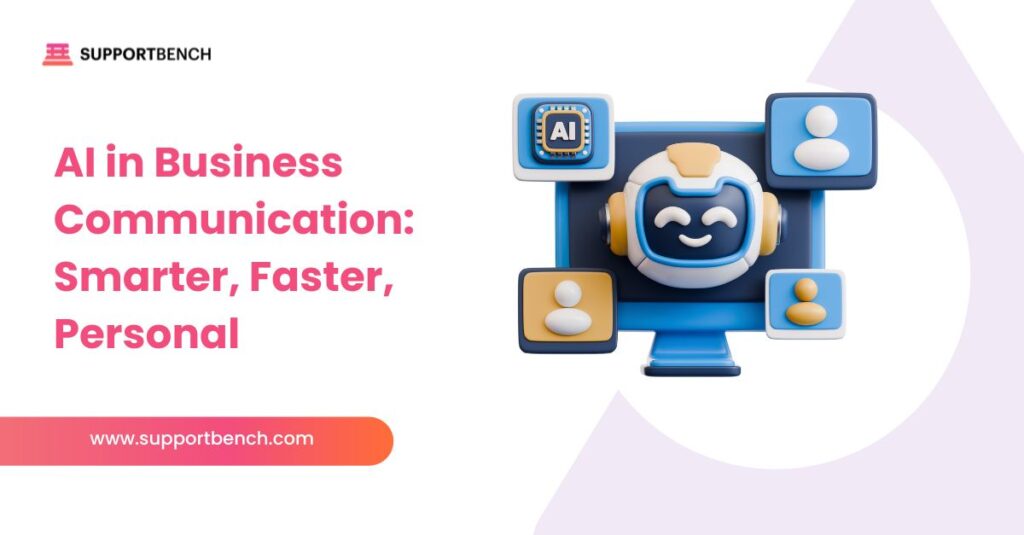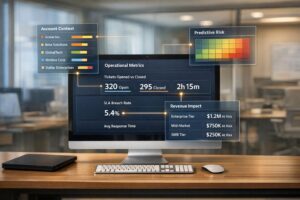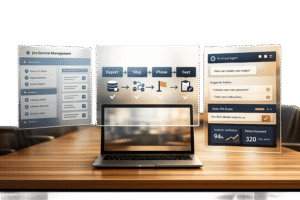Artificial intelligence (AI) is no longer a distant idea. It is shaping how businesses communicate every day. From customer service chatbots to predictive analytics in CRM systems, AI is driving a shift in the way teams connect with clients and with each other.
For businesses, the question is no longer if AI will play a role in communication, but how. AI is already reshaping how companies connect with customers, collaborate internally, and make decisions.
The following sections explain what AI can and cannot do in communication, the practical tools companies are using, the technologies driving these changes, and the benefits, challenges, and future outlook of AI-driven communication.
At a Glance:
AI is transforming business communication by making it faster, more scalable and more personalized. Tools such as chatbots, CRMs and meeting platforms improve digital customer engagement and teamwork. Challenges include data privacy, trust and the risk of over-reliance. The future is hybrid, with AI handling routine tasks while people focus on empathy, creativity and strategic decisions.
How AI is Transforming Business Communication

AI technologies are reshaping communication by making it faster, more scalable, and more precise. Tools such as natural language processing (NLP), chatbots, and predictive analytics now play central roles in how businesses engage with customers and collaborate internally.
- Speed and efficiency: AI systems can respond instantly to routine questions, cutting down wait times and freeing employees for complex issues.
- Scalability: AI-powered chatbots can handle thousands of inquiries at once, something human teams cannot match.
- Personalization: By analyzing customer data, AI can recommend tailored solutions or messages that make interactions feel more human.
- Collaboration: Internal tools powered by AI, like transcription services or meeting intelligence platforms, make teamwork smoother and improve your support team communication.
Platforms like Supportbench bring these capabilities together — from meeting intelligence to customer history — ensuring teams always work with shared context instead of fragmented silos.
This transformation is part of a broader digital transformation, where AI-driven tools integrate into everyday business operations, creating faster decision-making cycles and new ways to deliver customer success.
The result is a shift from communication that is primarily reactive to one that is proactive and anticipatory.
You Might Also Like:
What AI Is (and Isn’t) in Business Communication
AI improves communication efficiency, but it cannot replace empathy or human judgment.
What AI Is
➤ Real-time assistance: Chatbots and virtual agents can answer questions instantly, 24/7.
➤ Predictive insights: Analytics tools can forecast customer needs, helping businesses make better decisions.
➤ Automation: Routine tasks such as drafting emails, scheduling meetings, or categorizing support tickets can be handled without human intervention.
➤ Knowledge management: AI systems can deliver real-time insights and self-service options, helping both employees and customers find answers quickly.
What AI Isn’t
➤ Human empathy: AI can recognize words and patterns, but cannot truly understand emotion or intent at a deep level.
➤ Nuance in complex interactions: High-stakes negotiations or sensitive HR conversations still require human judgment.
➤ A replacement for people: AI improves communication, but does not replace the human touch that builds trust.
In business analytics, AI can process data at speed, but interpretation still depends on people who understand context and nuance. The key distinction is that AI is a tool for support and amplification, not substitution.
How is AI used in business communication?
Businesses are adopting AI across multiple communication channels. The most common uses include:
AI Writing Assistants
Platforms powered by AI help draft, edit, and improve written communication. They can create emails, internal reports, or marketing copy while adapting tone to match brand guidelines.
Example: Companies using Grammarly’s AI engine see tailored suggestions that reflect each user’s writing style and context, improving clarity and consistency across internal and external communications.
AI-Powered Meeting Tools
From automatic transcription to real-time translation, these tools reduce manual note-taking and improve collaboration. Teams spend less time documenting and more time deciding.
Chatbots and Virtual Agents
These tools provide round-the-clock customer service. They answer FAQs, guide customers through troubleshooting, and escalate issues to human agents when needed.
AI-Powered CRMs
Modern customer relationship management systems integrate AI to predict customer behaviour, segment audiences, and recommend personalized actions. These CRMs serve as central intelligence hubs for customer interaction, making communication more targeted and effective.
Example: HubSpot’s “Breeze” AI tools are embedded within its CRM to help with predictive lead scoring, email recommendations, and task prioritization — enabling teams to act proactively on insights.
➤ Supportbench acts as an AI-powered CRM hub, surfacing risk signals, automating follow-ups, and aligning communication across teams so customer interactions feel seamless.
Types of AI That Are Reshaping Business Communication

AI is not a single technology. It is a collection of tools that serve different functions in communication:
Natural Language Processing (NLP)
NLP helps AI understand and generate human language. This is the foundation for chatbots, email assistants, and sentiment analysis tools.
Generative AI
Generative models create new content, from emails and reports to personalized recommendations. They help companies scale content without sacrificing quality.
Speech Recognition and Text-to-Speech (TTS)
Voice-driven communication is becoming common in customer service and accessibility tools. Speech recognition turns spoken words into text, while TTS makes systems more inclusive by reading content aloud.
Predictive Analytics
By identifying patterns in past data, predictive tools forecast customer needs and suggest proactive communication strategies. For example, they can alert support teams to potential churn risks before customers leave.
Predictive analytics strengthens business strategy, turning communication into a forward-looking tool rather than a reactive channel.
The Benefits, Challenges, and Future of AI-Driven Communication
AI is redefining business communication, offering clear gains while raising new challenges.
Benefits
AI delivers measurable business impact by improving customer satisfaction, efficiency, and growth potential.
- Higher CSAT and Loyalty: Consistent, personalized responses make customers feel valued and drive repeat business.
- Stronger NPS and Referrals: Positive, seamless interactions increase the likelihood that customers will recommend your brand.
- Lower Operating Costs: Automating repetitive tasks reduces staffing pressure and frees teams for high-value work.
- Improved CLTV (Customer Lifetime Value): Retained customers contribute more revenue over time, boosting long-term profitability.
- Smarter Strategic Decisions: Real-time analytics from AI systems give leaders the insight needed to anticipate risks and act with confidence.
Challenges
AI adoption brings efficiency gains but raises concerns about trust and balance.
- Trust and accuracy: Customers may hesitate to trust AI responses if they feel impersonal.
- Data privacy: Storing and analyzing customer data raises security concerns.
- Over-reliance: Companies risk losing the human element if communication becomes too automated.
The Future
The future of business communication lies in hybrid models. AI will handle the repetitive, data-driven parts, while people focus on empathy, creativity, and strategic conversations.
In the context of digital transformation, this hybrid approach ensures companies maintain efficiency while keeping human connection at the core.
Far from replacing human connection, AI will strengthen it by giving teams more time for meaningful work.
Conclusion
AI-driven business communication is no longer a passing trend—it has become a strategic necessity. From digital customer engagement to internal collaboration, AI tools are changing how organizations operate and connect.
Success depends on balance: using AI for speed and insight while relying on people for empathy, creativity, and trust.
Supportbench brings conversation insights, knowledge suggestions, and intelligent routing together in one place, so agents have the right context and customers avoid repeating themselves.
It links directly to your CRM and key systems, highlights risk and intent, and keeps every hand-off seamless. For a closer look, book a free demo.










